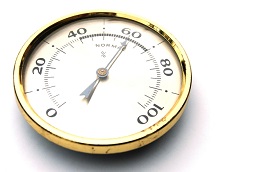As the temperatures increase, many of us will reach for the air conditioning controls without giving it much thought. Unfortunately, when the cost of energy bills starts to grow rapidly, we may wonder if we have a fault, rather than considering the humidity levels. Humidity is an important consideration for your HVAC system, and it can be taxing. Due to the dual seasonal nature of the system, your air conditioning is faced with high humidity levels that need to be rejected in summer, but increase the levels in winter when humidity is usually scarce. In fact, the presence or absence of humidity is considered to be a primary catalyst in the cost of energy bills. In order to reduce your energy costs, you need to understand the crucial role humidity plays in the proper function of your air conditioning system.
The Effect of Humidity on Cooling:
Humidity is the term used for moisture in the air. All air conditioning systems are equipped with a compressor attached to some form of a cooling coil. The air flowing throughout the ducts is continuously colliding with these coils, which reduces the temperature. This creates a cooler temperature inside your home.
Humid air has a high amount of liquid vapor or moisture, and liquid is harder to cool. When moist air collides with a cooling coil, it starts to condense. Condensing moisture from the air is the best way that the air conditioning system can create a dehumidifying effect.
Unfortunately, this process of removing humidity uses most of the energy being supplied to the coils. This means that instead of effectively cooling the room, the air is simply dehumidified. It is only when the humidity level has reached an acceptable margin that the coil can start cooling the air. If your indoor air has high humidity levels, it will cause your air conditioning system to use more energy for the compressor, increasing energy costs. You are also likely to notice that your air conditioning system is not as effective at producing your desired temperature.
The Effect of Humidity on Heating:
In colder temperatures, the atmospheric moisture levels will drop. This change in humidity will mean that the heat pump in your HVAC system is required to work harder. The reason for this is that heat transfer through convection is easier than radiation. If the air is humid and moist, it facilitates convection current heat energy transfer more effectively, increasing the temperature to a comfortable desired level more quickly.
Solving the Problem:
Fortunately, there is a solution to the humidity problem. HVAC systems can be paired with dehumidifiers and humidifiers to achieve a greater control of the moisture levels in the air. Effective management of the atmospheric moisture levels can not only decrease energy consumption, but can increase the effectiveness and potential lifespan of the system. By reducing the potential strain on your HVAC system, you can minimize wear and tear or the risk of cascade failure. By introducing a dehumidifier and humidifier, there is no need to worry about air moisture levels. You can just relax and enjoy the perfect temperature inside your home regardless of the time of year.
